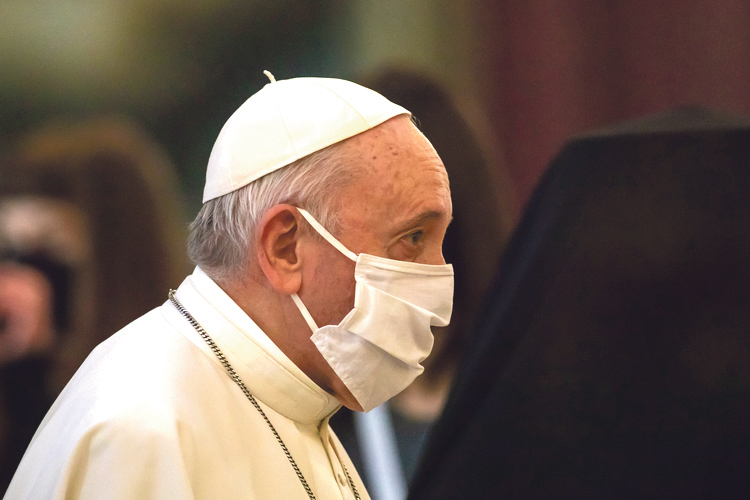
WelCom November 2020
In his new encyclical, written during the first wave of the coronavirus pandemic, Pope Francis challenges humankind to reset priorities and unite communities riven by racism, inequality and climate change.
Fratelli Tutti, signed in Assisi on October 3, 2020 urges people of good will to promote fraternity through dialogue, renewing society by putting love for others ahead of personal interests. Throughout the encyclical, the pope emphasises the primacy of love, in both social and political contexts.
It is clear the Pope sees the questions regarding the purpose and meaning of life that many have asked during the lockdowns as an opportunity to reset a pattern of catastrophic systemic failures that has created an unequal and polarised world.
The pandemic has taught people and society that ‘no one is saved alone; we can only be saved together’. The coronavirus presents the world with an opportunity for real systemic change – Francis suggests that to believe we can carry on as before is ‘denying reality’.
“The pain, uncertainty and fear, and the realisation of our own limitations, brought on by the pandemic have only made it all the more urgent that we rethink our styles of life, our relationships, the organisation of our societies, and, above all, the meaning of our existence.”
Pope Francis, Fratelli Tutti
Pope Francis has always wanted his papacy to be one of action – placing the needs of the poor, marginalised and disenfranchised at the centre of his ministry. As a community of believers, Catholics are expected by Pope Francis to mobilise and become agents for change in the world. This action is to be based upon the canon of Catholic social teaching.
While Laudato si’ (Praise to You, 2015) implored the world to ‘care for its common home’, Fratelli Tutti offers teaching devoted to the concepts of fraternity and social friendship based upon the example of St Francis of Assisi who ‘wherever he went…sowed the seeds of peace and walked alongside the poor, the abandoned, the infirm and the outcast, the least of his brothers and sisters’.
Fratelli Tutti offers a new vision of society in which human dignity and the human rights of all are respected. The Pope believes that actions based on the common good – the concept that everyone should be able to contribute meaningfully to society – must form the bedrock of politics and that people must acknowledge and respect everyone as their equal.
Pope Francis takes pains to point out such a transformation will not be easy. Rather, it will be a process without an endpoint, something to be continually worked at. Fratelli Tutti is an encyclical which above all teaches that complacency is the enemy of a peaceful and just society.
Dark clouds
But in order to engage in action, the problem must be diagnosed so that people know where to direct their energies. There can be no doubt from the first chapter, ‘Dark clouds over a closed world’, that Pope Francis understands the complexity of the crisis facing the world.
As well as the existential crisis that has led to the disintegration of communities and social relationships, he paints a grim picture of a world undergoing what he calls a ‘third world war fought piecemeal’ which – along with hunger and human trafficking – presents a sustained attack on the dignity of the human person.
Fratelli Tutti contains a number of references to the populist politics that have led to ‘hyperbole, extremism and polarisation becoming political tools’. The Pope also observes the resurgence of racism, and the disintegration of intergenerational relationships – all of which demonstrate the innate individualism, lack of empathy and aggressive nationalism which lies at the heart of the global crisis.
Decisive commitment
The solution to this crisis ‘demands a decisive commitment’ from individuals and from politicians and religious leaders in particular. Politicians need to reorientate their mindset away from individualism towards a commitment to the common good and what the Pontifical Council for Justice and Peace has termed ‘social love’. This is, he notes, ‘a force capable of inspiring new ways of approaching the problems of today’s world, of profoundly renewing structures, social organisations and legal systems from within’.
If only we might rediscover once and for all that we need one another, and that in this way our human family can experience a rebirth; with all its faces, all its hands and all its voices, beyond the walls we have erected.”
Pope Francis, Fratelli Tutti
Politics needs to become a vocation of service, charity and generosity rather than a means to exercise power. Religious leaders need to engage in dialogue with one another in order to ‘reawaken the spiritual energy that can contribute to the betterment of society’, and to prevent the distortion of religious beliefs that lead to violence.
Ultimately, this is an encyclical which teaches that we are dependent upon one another to thrive and reach our full potential as human beings.
Read Fratelli tutti in full at: vatican.va/content/francesco/en/encyclicals/documents/papa-francesco_20201003_enciclica-fratelli-tutti.html
Sources: CNA News, The Conversation UK, Catholic Outlook
Pope Francis’ third encyclical
Fratelli Tutti is Pope Francis’ third encyclical following on from the 2013 Lumen fidei and 2015 Laudato si’. Written during the first wave of the Covid-19 pandemic, the 45,000-word papal letter will inevitably be known as the ‘Covid encyclical’.
Fratelli Tutti, the encyclical’s opening words, means ‘all brothers’ in Italian and is taken from the writings of St Francis of Assisi, the ‘saint of fraternal love’.
Encyclicals are considered one of the highest forms of communication from the Pope to the world’s 1.3 billion Catholics and people of goodwill everywhere. They are exhortative in tone. They counsel and encourage and make clear that what is said is not to be taken lightly. They deal with complex social and moral issues and back up their claims with reference to the Bible and to Catholic tradition and doctrines.